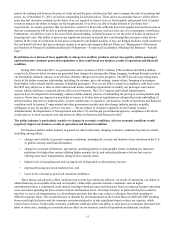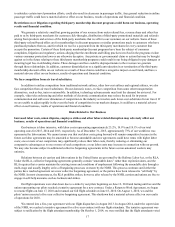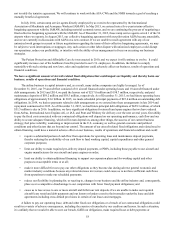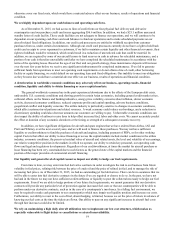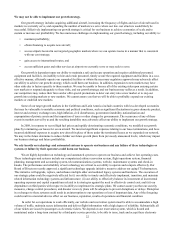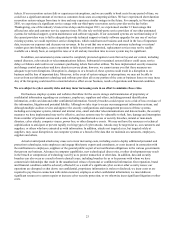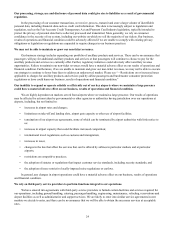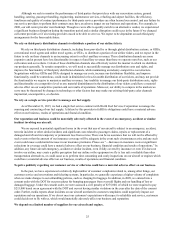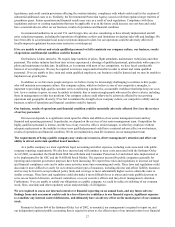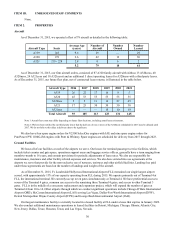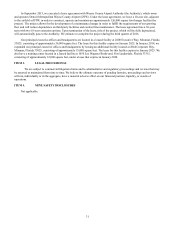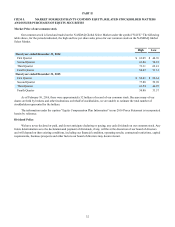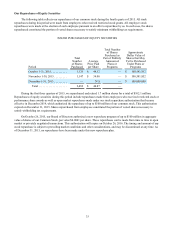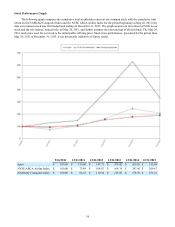Spirit Airlines 2015 Annual Report Download - page 24
Download and view the complete annual report
Please find page 24 of the 2015 Spirit Airlines annual report below. You can navigate through the pages in the report by either clicking on the pages listed below, or by using the keyword search tool below to find specific information within the annual report.24
Our processing, storage, use and disclosure of personal data could give rise to liabilities as a result of governmental
regulation.
In the processing of our customer transactions, we receive, process, transmit and store a large volume of identifiable
personal data, including financial data such as credit card information. This data is increasingly subject to legislation and
regulation, such as the Fair Accurate Credit Transparency Act and Payment Card Industry legislation, typically intended to
protect the privacy of personal data that is collected, processed and transmitted. More generally, we rely on consumer
confidence in the security of our system, including our website on which we sell the majority of our tickets. Our business,
results of operations and financial condition could be adversely affected if we are unable to comply with existing privacy
obligations or legislation or regulations are expanded to require changes in our business practices.
We may not be able to maintain or grow our non-ticket revenues.
Our business strategy includes expanding our portfolio of ancillary products and services. There can be no assurance that
passengers will pay for additional ancillary products and services or that passengers will continue to choose to pay for the
ancillary products and services we currently offer. Further, regulatory initiatives could adversely affect ancillary revenue
opportunities. Failure to maintain our non-ticket revenues would have a material adverse effect on our results of operations and
financial condition. Furthermore, if we are unable to maintain and grow our non-ticket revenues, we may not be able to execute
our strategy to continue to lower base fares to address an underserved market. Please see “—Restrictions on or increased taxes
applicable to charges for ancillary products and services paid by airline passengers and burdensome consumer protection
regulations or laws could harm our business, results of operations and financial condition.”
Our inability to expand or operate reliably or efficiently out of our key airports where we maintain a large presence
could have a material adverse effect on our business, results of operations and financial condition.
We are highly dependent on markets served from airports where we maintain a large presence. Our results of operations
may be affected by actions taken by governmental or other agencies or authorities having jurisdiction over our operations at
airports, including, but not limited to:
• increases in airport rates and charges;
• limitations on take-off and landing slots, airport gate capacity or other use of airport facilities;
• termination of our airport use agreements, some of which can be terminated by airport authorities with little notice to
us;
• increases in airport capacity that could facilitate increased competition;
• international travel regulations such as customs and immigration;
• increases in taxes;
• changes in the law that affect the services that can be offered by airlines in particular markets and at particular
airports;
• restrictions on competitive practices;
• the adoption of statutes or regulations that impact customer service standards, including security standards; and
• the adoption of more restrictive locally-imposed noise regulations or curfews.
In general, any changes in airport operations could have a material adverse effect on our business, results of operations
and financial condition.
We rely on third-party service providers to perform functions integral to our operations.
We have entered into agreements with third-party service providers to furnish certain facilities and services required for
our operations, including ground handling, catering, passenger handling, engineering, maintenance, refueling, reservations and
airport facilities as well as administrative and support services. We are likely to enter into similar service agreements in new
markets we decide to enter, and there can be no assurance that we will be able to obtain the necessary services at acceptable
rates.



